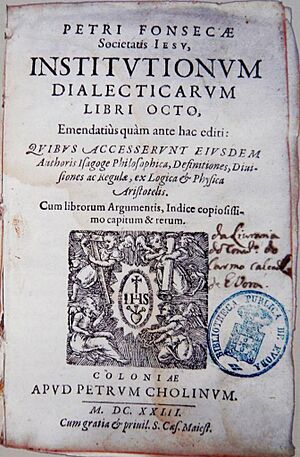Pedro da Fonseca (philosopher) facts for kids
Pedro da Fonseca was a very smart Portuguese thinker who lived a long time ago, from 1528 to 1599. He was a Jesuit, which means he was part of a special group of Catholic priests. He was also a great philosopher and theologian. This means he spent his life thinking deeply about big questions, like how we know things (logic) and what reality is made of (metaphysics).
Because he was so good at understanding these complex ideas, people called him the 'Portuguese Aristotle'. Aristotle was a famous ancient Greek philosopher. Pedro da Fonseca also helped create an important series of books called the 'Cursus Conimbricenses' with other scholars like Manuel Góis. These books were used to teach philosophy in universities.
Pedro da Fonseca's Important Writings
Pedro da Fonseca wrote several important books that shared his ideas on logic and philosophy. These books were studied by many people during his time and even after he was gone.
- Institutionum Dialecticarum: This book was published in Lisbon in 1564. It was about logic, which is the study of how we can reason correctly and make good arguments.
- Commentariorum in Libros Metaphysicorum Aristotelis: Published in Rome in 1577, this work was a detailed explanation of the ideas of the ancient Greek philosopher Aristotle, especially his thoughts on metaphysics. Metaphysics is about understanding the basic nature of reality and existence.
- Isagoge Philosophica: This book came out in Lisbon in 1591. It served as an introduction to philosophy, helping students understand the main ideas and questions in this field.
Learn More
- Conimbricenses: This refers to a group of Jesuit scholars from Coimbra, Portugal, who wrote important philosophical commentaries, including those Pedro da Fonseca helped create.
See also
 In Spanish: Pedro da Fonseca para niños
In Spanish: Pedro da Fonseca para niños
 | Precious Adams |
 | Lauren Anderson |
 | Janet Collins |


